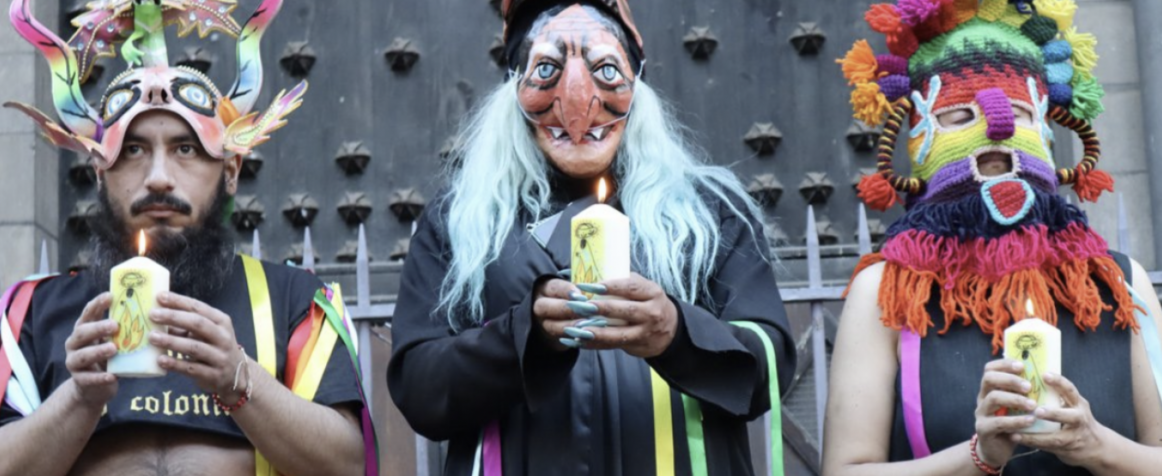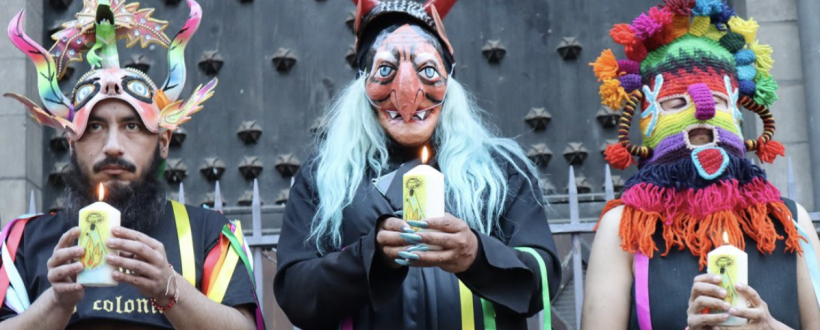PODCAST AVEC LE COLLECTIVE AYLLU
- On remercie Lita et Elisabeth qui était présentes pendant l'enregistrement du podcast, et qui nous ont aidé pour les traductions en espagnol!
- "Nuestro Juramento" : projection du film à 20h au Kinosch
- Get-Out : 17 mai de 18h à 21h.

This week, we took the time to chat and to record podcast with the members of the Ayllu collective, Alex and Pancho, who are currently in residence at Squatfabrik #1!
As we didn't all speak the same language when we recorded, we decided to mix a bit of French with English and Spanish, and the result became a great conversation about the materiality and past life of bodies, the ancestralities and present of migrants in Europe and the need to build love and protection.
Listen to the podcast here:
And as we suspect that not everyone understands English and Spanish, we have also produced an English transcript which you can read here:
A MOMENT WITH: THE COLLECTIVE AYLLU FROM SQUATFABRIK #1
So today we are with Pancho and Alex from Ayllu Collective from Spain. And first of all, I would like to ask you to introduce yourself. Who are you? What are you doing in Spain in the collective?
ALEX: We are from the Ayllu Collective. We come from Spain. My name is Alex Aguirre. As I said, we are part of the Ayllu Collective. We are based in Spain, specifically in Madrid and Barcelona. We are migrants from different places, from Abya Yala or Latin America. We have been here since 2009. The collective Ayllu is first the collective “Migrantes Transgressores” in 2009. And from there, in 2017, an artistic path was opened, which is the collective Ayllu. And we focused more on research and artistic expressions, anti-colonial and sexual dissidence. “Ayllu” is a word in Quechua, and it means extended family . For us, it's like that: a work in community, in family, with affection, research and artistic themes.
PANCHO: My name is Pancho, I’m also part of the Ayllu collective. In the collective, we are 5 people. We all have different backgrounds and come from different places, as Alex has explained. We have backgrounds of anthropology, sociology, political sciences, art history, psychological therapy, so there are different things going on and connected. And the main thing is that, since Migrantes Transgressores, Transgressive Migrants, from 2009, and then more intensively since 2017, we have been working on a construction of a creative construction of an archive that doesn't exist and a construction of a community that doesn't exist because white supremacy doesn't want us to exist.
So we decided to create our community, to embrace our community of queer people of colour. People of different backgrounds in our community participate people from Latin America, from Abya Yala, but also people from Africa, people from Asia, so we try to connect in the context of Pain. All those memories that we call the memories of pain and the memories of pleasure. How to manage all those things because if you think for example in slavery in 16th, 17th, 18th century in Latin America, the slavered people, they were suffering the slaverism, but at the same time they did that with pleasure, because that was the only way of surviving to that violence. So they dance, they sing, they make art, through that connection of pleasure and pain.
How does the work at the Kufa for the residence continues the work of the collective?
ALEX: Yes, for us it has been important in the artistic creation and in the exchange with other bodies in Europe, not only migrant bodies but also the exchange of realities, of past, of ancestrality, and also share our knowledge. Because this exchange of knowledge is very important and tell, as they say in performance, what our realities are : our ancestralities, the importance of food, of community relationships. So this exchange is important to know the realities of other bodies.
Because in Europe there is no other way of seeing things. In other places, in white spaces, precisely white spaces, and, I don't know, heterosexual, it's important to mark and be in us, with the color of our skin, brown, black, as sexual dissident, as trans. It's difficult, but maybe with the experience, we have been very active for many years and for us it is very important to mark this part of the anti-colonial migration and the bodies outside the heteronormativity.
PANCHO : Yeah, I just wanted to complement the important thing of putting in the center the migration, the process of migration, because when we migrate to Europe our situation gets worser. When European people travel to our countries, they get better. So that structure of power, it is geopolitical. It is not from 16th century colonial time. It is alive today. So being a migrant in Europe, being a brown migrant in Europe has meanings. And also, if you are a brown migrant, and sexual dissidents have another level of complexity. We have been working very much in this kind of political actions of recognizing the punishment to migrant people, the violence we receive and so on. So somehow... We were very much angry in many of our very first projects. We were very, very angry with Rabia. How do you say Rabia? Enraged. So, at certain moment, we also find out that could not continue like that because we were going to be ill. We were very sick, emotionally sick. So, we decided how to find a way to turn into a love project. So, we're searching for love, looking for love. I'm looking for love, it is not only to have a partner and so on, but a communal love. And in that sense, we found in the spiritual, a good answer. Because in many of our ancestral communities, spirituality is so, so, so important. So, we entered into these narrative memories, the erasable memories also, because in many of our families, many non straight-Catholic practices were kind of hidden and they feel …culpable, how do you say culpable? Guilty? Guilty, guilty for having certain practices. So, we started to enter into that issues and that's why our project here in Kufa, it's constructing a sort of altar for non-recognized deities. The mountain is a deity. And there are many, many non-Western figures, also some of them non-human figures, that create a sort of spiritual archive of what has been hiding. So that's what we are trying to work with here.
ALEX: Adding a little, about the process of spitting out my anger. When we were talking about healing. At first, spitting out my anger was an afternoon of poems with sexual dissidents and migrants. After two years, three, we started spitting out our anger to heal. And also taking into account the question before... Something I read yesterday came to my mind about how Europe does not recognize us, or only looks at the migrant struggle as a process that we have to heal and integrate into our society, but it does not recognize a colonial past. So, there are two things, the migrant struggle and also a reparation, a recognition of the colonial past.
Alex, last question. You already performed during your residency. How was it for you to perform?
ALEX: I'm... At first, I was nervous. And then, your company, your team, your company, has been very important. And it was also a friendly space. A friendly space. It was good. The mutual company of the collective team is as always important. And that gives strength. And at that moment, with the Diablo Huma mask, I didn't think about people or space. It was like putting myself and taking the energies from my land. Because they are... For those who didn’t see the performance, it was like ... healing, healing the space, with the candle, I mean, spiritual. So it was like... very important for me to share.
You also have a screening, planed for Thursday, May 2nd. Can you talk maybe a little bit about it?
PANCHO: Yes, that's a film that is very much connected with all this spiritual thing we were talking about. It's a sort of, I found it a sort of protection film. We look for elements that protect us. Little things like for example this red thing, it's something very traditional from our countries. For children, when you are very, very little, mums put you this for the protection against illnesses and bad energies. For the health, it's for everything. The kids, the babies, the children, it's for protection. Yes, it's for protection. So, everything that we are doing are little elements to protect our children, from all the all the bad things that are around. The film of this Thursday, It is a film made in seven stations, recalling or rethinking the station of the Via Crucis, the Christ stations of Holy Week, Holy Week, Semana Santa. It is a film we made, how many years ago? 2 years ago, I think, two years and a half ago, in Barcelona. And it is in seven points of the city of Barcelona. For example, one is the monument to Antonio López y López, that one was, who was one slaverist of 19th century that has a square and a monument. So, we did the action there or in the monument to Christopher Columbus. So different places of, in these stations I mentioned before, of pain, but also pleasure at the same time. Because for example, one of the stations, it's in the road, the main road of sex work in Barcelona. So, it's a place also where migrant people find an economic solution to their lives. So, it's a place also for living. So how to manage these two levels of pain and pleasure and survival and and the wish to continue our lives somehow. Because one of the last stations, it is a call to us to continue living because we want to live. We have survived because our ancestors have survived. So, we have the legacy, we have to give the legacy of the survival to the next generation too. So that's the film. And after that, we will have a conversation. So, everyone is welcome to come.
ALEX: The past is also the future, we know that well. Diablo Huma, Pancho also told us about, is the symbol in Ecuador, in the Andean countries, is the symbol of protection. And it protects the community, the protection of the community. So here it was that, you told me how you felt [during the performance], and when I put that on, it was like feeling strong and protected for myself and the collective in a space. And that, we also did the Diablo Huma in the video, in “Our Oath” [the film], also with the mask of witches and the devil, which is a spiritual way to protect us.
Thank you. And yes. See you on Thursday ! Fantastic.
